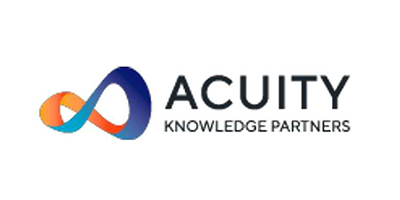Empathy is the ultimate metric: Acuity Knowledge Partners’ story in the time of COVID-19

Authors:
- Rathnakala Kumaragurunathan, Associate Director, Investment Research
- Rohan Fernando, Associate Director, Specialised Solutions
Human beings are an adaptable species. It is what makes us stand out among this planet’s biological organisms. It is also how – despite disruptions in technology, business and markets, especially in the past decade – we have taught ourselves resilience. This we believed until the COVID-19 pandemic caught us all by surprise. This was different, a new kind of test that raised uncertainty levels at work – and at home – to unprecedented heights. The damage seems to have already surpassed what was experienced during the 2008 financial crisis, with almost all nations facing circuit breakers.
Uncertainty makes everyone fearful for their health, the health of their loved ones, their jobs and many more factors. The absolute least we can do is understand this and do everything possible to make sure our employees are safe and provide them with a sense of security.
The collective behavioural changes to our work and daily lives beg the question, how does the show go on?
At our Sri Lanka delivery centre, we have faced and overcome multiple challenges in our short 17 years of existence; resilience is among the foundational traits of our DNA. Our operations continued uninterrupted during the civil war, as they did last year after the April Easter attacks. We have taken adversity in our stride.
Sustaining efforts in the face of overwhelming odds is no easy task, but it is possible. Putting our employees’ best interests first and optimising the trust of our clients are at the centre of our business continuity planning (BCP) efforts.
As a business with a global presence, we, the Colombo delivery centre, were already privy to the effects of the outbreak on our delivery centre in China. Our teams carefully structured the lessons learnt and used them to modify our BCP. One of the biggest hurdles in our business is the practical issues that working from home (WFH) raises given the stringent compliance and information security standards we abide by and that are an intrinsic part of our value system.
Being prepared is overrated – having grit is more critical
But it was imperative that we found a way – our IT, Technology and Information Security teams worked on setting up a robust system that could be presented to our clients for approval. We were prepared. However, the art of bouncing back is not only about being prepared; having grit is as important.
And grit we had…
…from collaboration between our departments to the speed with which our managers and teams responded to the unplanned “holiday” announced by the government on Sunday, 15 March 2020.
Our clients are our strength, too. While our managers took timely decisions by seeking approval from the respective clients to activate WFH for their teams, the majority of our clients understood: it was about the people.
Thus started the marathon for our IT team. They were the team of the hour and the critical factor for the system to be deployed and held. If deploying secure virtual work spaces for the teams was a challenge, managing internal expectations was equally trying.
This is where clear and decisive leadership was critical. Hard decisions, and sometimes unpopular ones, were taken to ensure that resources were optimised and were allocated fairly. The tone at the top was clear and respected amid all the confusion and panic. The emphasis was always on ensuring the safety of our employees while fulfilling the tall order of minimal disruption. The nature of our industry is such that we, as an organisation, were certainly not prepared for our c.3,000 employees to assume their roles remotely. Senior leadership and employees went out of their way to seek solutions to make this shift almost overnight. The leadership team was cognisant of the challenges employees would face when WFH, such as taking care of young children or older relatives, and many other hurdles. Doing the best one could by adapting to the new norm is all that was asked of Acuity Knowledge Partners’ employees.
Managing slower internet connections and investing more time to deliver the best to our clients did not seem to be difficulties against the grander scheme of things – the challenge of safeguarding one’s health and safety.
How Acuity Knowledge Partners’ Alternative Data team migrated to the WFH model to provide uninterrupted support to global primary research teams – an example
Acuity Knowledge Partners is engaged in many client-dependent operations such as feeding mammoth datasets for Wall Street analysts. This is more of a technological service operation carried out by many developers and data analysts. These operations are continuous, 24/7 processes, with many bots running collecting data during the most part of the day and night. So keeping those alive and providing ongoing fixes are critical. Most of the data in the alternative data space is generated through online content from the web, which is very dynamic, as each site keeps changing. So the real operation is fixing bots to adapt to website changes and compiling data in structured formats so analysts could examine the data and churn out analytics, insights and research.
It is imperative that these operations be executed even in crisis situations, as data during such situations is critical not only for live research but also for maintaining an uninterrupted time series of data.
Walking the talk – Following best practices during business-as-usual (BAU) times
Since this operation needed a lot of attention and monitoring, the team worked towards de-centralising the infrastructure, enabling the workload to run from multiple locations (as part of our BCP). With this strategy, the Acuity Knowledge Partners team broke down the operation into geographical locations and executed it from different servers.
We also ensured the robustness of a redundant network by duplicating our bots to make sure that in the event a bot is blocked or broken, we would have another bot running, collecting the same data from a different location.
BCP strategy – The nuts and ‘bots’
As part of the strategy, we had our production environment in two data centres – one cluster in a remote location (Chicago, USA) and the other in Colombo. This facilitated remote data collection, while providing one level of redundancy.
Addressing crucial questions – In a crisis scenario, how do we manage the development process, which is the backbone of the operation?
We set up a development environment with the security protocols required in the event of a real crisis. The team also set up copies of the development environment on their respective work laptops.
Thus, two levels of BCP were established – a remote development environment that would enable us to continue working during a major crisis (such as the Easter attacks) and remote working access.
Production environments are hosted externally with redundancy, so it is just a matter of enabling remote access on client approval.
This enabled us to switch to WFH without any lags; the team had only to obtain the necessary approvals from the clients, and it was then merely a matter of the local IT team enabling the process. In less than an hour, we had our entire production and development environment set up for working remotely.
This has allowed us to continue to capture critical data points that would no doubt play a significant role in financial analysis during the coming weeks.
BCP vs sustained catastrophe
Business continuity has been stretched in the current situation, which is beyond a disruption that spans a few days or a week. It is an ongoing change to the status quo. We believe that as a nation, we are far more resilient and ready to adapt to different conditions than we were just a decade ago. This is mainly due to the almost-three-decades-long civil war and the unfortunate, unexpected situations that we as a nation have been through. We have, however, managed to make this our edge.
Business continuity is not something most organisations started setting up during COVID-19, but it has been something that we as a nation have taken seriously and keep iterating religiously. Our plans have been put to test many a time, and here we are again in yet another real and rather opaque situation.
But, as the wise say, it is what it is – so we, as an organisation, continue to seek improvements to automate many of our operations and make them even smoother amid crisis. Our teams continue to work on containerising all production environments so we can quickly migrate them across production locations, and on building application programming interfaces (APIs) to automatically transfer data to our analysts in the EU and US. We are also looking at possibilities of migrating this to a cloud; while there is some resistance from global research houses on such migration currently, the world may be a different place when all this is over, and then, adapting to cloud computing may perhaps be faster than we predict, because it has BCP by default.
Now what?
Fast forward a week later: we have continued to support our clients with minimal or zero disruption. The majority of our employees are WFH-enabled, with collaboration and out-of-the-box thinking at their best.
It is time to re-think BCP strategies – conventional BCP strategies in our industry have always involved a remote location, such as a disaster recovery site, to continue services. But experience has taught us that it may not always be fool-proof when faced with sustained challenges such as the COVID-19 outbreak we experience today. It is time to proactively update our BCPs, as an industry, and look at having secure WFH access to face sustained catastrophes, seeking the necessary client approvals and strengthening information security measures, thereby keeping the trust of our clients intact.


